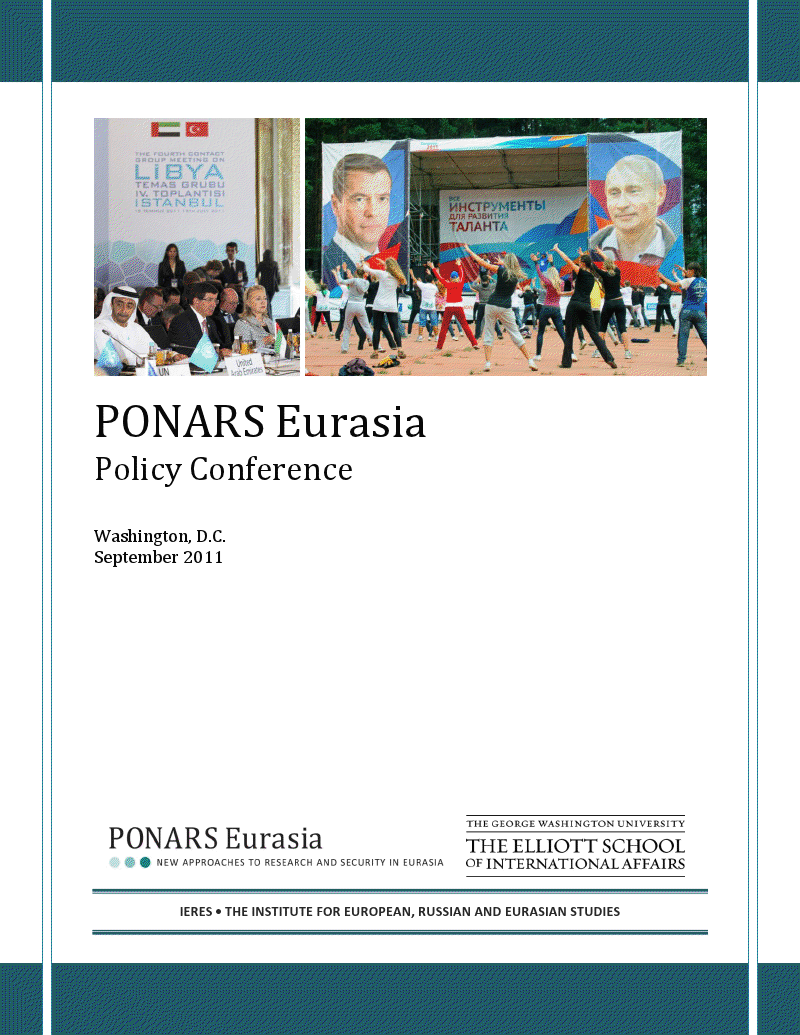Foreword
By Cory Welt
The George Washington University
This collection is an accompanying volume to the annual policy conference of the Program on New Approaches to Research and Security in Eurasia (PONARS Eurasia), held at The George Washington University’s Elliott School of International Affairs in September 2011. PONARS Eurasia, supported by the Carnegie Corporation of New York, promotes scholarly work and policy engagement on transnational and comparative topics within the Eurasian space, drawing on the expertise of a global network of social scientists.
The collection is divided into seven parts. The first part, Russian Politics: A New Agenda?, examines actors and issues in Russian domestic politics on the eve of the 2011-2012 election cycle. The four memos in this section assess the intention and shortcomings of “patriotic education” in Russia; the volatile mix of rising nationalism, migration, and violence in the North Caucasus; grassroots efforts to insert real policy discussion into Russia’s largely symbolic politics; and the Kremlin’s preparations for new elections throughout the country, including the creation of the amorphous Popular Front.
The second part, Taking Stock of Democracy in Ukraine, offers a critical view of political development in Ukraine since the February 2010 election of Viktor Yanukovych. While acknowledging the new administration’s reform efforts, the memos conclude that Ukraine’s governance problems remain largely unaddressed and, in many cases, have worsened. At the same time, a new centralization of power has led to an increasingly visible power play within the ranks of the ruling party and its supporters, suggesting the possibility of new fragmentation within Ukrainian politics.
The third part, New Directions in Eurasian Energy and Trade, explores dynamics of energy and trade across the post-Soviet region and its neighbors. The memos suggest analyzing the Russian oil industry as a more or less “normal” capitalist arena and call for greater attention to the structural—rather than political—drivers of Russian trade in oil and gas with China and Japan. A third memo brings to light an understudied but potentially significant emerging trade route linking China to Afghanistan—Tajikistan’s remote province of Gorno-Badakhshan.
The collection’s fourth part, The Future of the “Reset” in Russian-Western Relations, assesses the outlook for Russian-Western relations through the next electoral cycles in Russia and the United States. Two of the memos look at the impact of the reset to date. One concludes that it has kept anti-Westernism, seen in past election cycles, out of Russian domestic politics, while another sees the reset as insignificant and possibly harmful to U.S. foreign policy objectives. Other memos look at ways forward, including implementing practical measures for sustaining the reset; paying greater attention to domestic politics and mutual (mis)perceptions; and better aligning policy to preferred end-states in U.S.-Russia relations.
The fifth part, Color Revolutions Redux: Can the Arab Spring Spread to Post-Soviet Eurasia?, considers the possibility of a new wave of popular mobilization in post-Soviet Eurasia inspired by the Arab Spring. The memos view the chance of direct emulation anywhere in the region to be slim. However, they view Russia’s North Caucasus as the most likely site of popular unrest that could unfold in unexpected ways (and even be affected by the fate of North Caucasian diasporas in the Middle East). The memos also consider Russia’s response to the Arab Spring, as well as the domestic and foreign policy concerns driving it.
The sixth part, Rethinking the Arms Control Partnership, examines the prospects for arms control and technical cooperation between Russia and the West. One memo argues that bilateral arms control treaties harm U.S.-Russia relations more than they benefit strategic arms reduction. A second calls on NATO poliymakers to re- educate themselves on the utility of non-strategic (tactical) nuclear weapons and, on that basis, develop a coherent and unified policy in advance of the 2010 NATO Defense and Deterrence Posture Review. A third memo takes a fresh look at the rift between Russia and the West on European missile defense and the likelihood of Ukrainian involvement in such a system. A final memo explores the future of Russia’s state-led GLONASS satellite navigation system, assessing both its technical accomplishments and its continued production challenges.
The final part, Shifting Gears: Foreign Policy in Turkey and the Caucasus, reviews changing foreign policy contexts across Turkey and the Caucasus. Will Turkey’s efforts to increase its regional presence lead to the development of a Turkish sphere of influence? Will Azerbaijan seek to resolve the long-lasting Karabakh conflict by military means? Might Georgia back away from its singlemindedly pro-Western, and especially pro-American, foreign policy? Finally, what will it take for Russia to dramatically alter its Caucasus policy—and can it happen in time for the 2014 Sochi Olympics?
The efforts of many individuals went into the production of this volume and the organization of the 2011 PONARS Eurasia policy conference. In addition to all the authors and conference participants, I would like to especially thank Managing Editor Alexander Schmemann; Program Assistant Olga Novikova; IERES Executive Associate Caitlin Katsiaficas; Graduate Research Assistants Wilder Bullard and Justin Caton; and IERES Director Henry Hale. PONARS Eurasia, together with The George Washington University’s Elliott School of International Affairs, expresses its deep appreciation to the International Program of the Carnegie Corporation of New York for its ongoing support.











